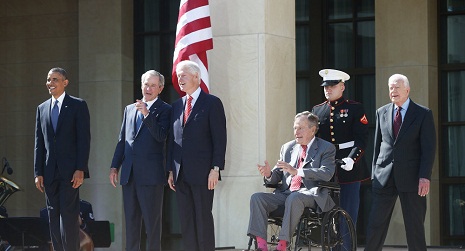But that’s fair, right? These men have served their country through the nation’s highest and most stressful office. The least we can do to repay them is to ensure a cushy retirement.
US House Committee Proposes to Increase Nuclear Triad Modernization Funds
But these post-presidency benefits seem especially baffling given that former presidents earn millions without the aid of government assistance. Last week, Hillary Clinton revealed that with their combined incomes, the Clintons have earned over $30 million in speaking fees and book deals since January of 2014.
With that kind of money, many Congressional lawmakers are questioning whether taxpayer funds should be used to toss what amounts to just a few more bucks on top of an already massive pile of cash.
"History shows that former presidents do very well financially after they leave office," Republican Representative Jason Chaffetz, chairman of the House Oversight and Government Reform committee, said in a statement. "In fact all former presidents are millionaires, making it unlikely that they depend upon their taxpayer-funded allowance to make ends meet."
Chaffetz co-sponsored a bill – the Presidential Allowance Modernization Act – to place a cap on those pensions. The bill passed the House Oversight panel on Tuesday evening.
The bill places a $200,000 limit on pensions, and would then reduce additional expenses by a dollar-for-dollar amount for income earned above $400,000. If Bush earns $400,050 next year, that’s $50 less he’ll receive from the government.
The US government has wasted billions of dollars in unnecessary programs that threaten to bankrupt the United States
"Taxpayers should not have to pay for a former president’s allowance if the former president is comfortable living earning more than $400,000 a year after leaving office," said Democratic Representative Elijah Cummings.
Especially considering what much of that money goes toward. When most of us retire, our golden years are spent in a glorious haze of Cheez Doodles and Jonny Quest marathons (or was that college?) But if there’s one thing a retired president needs, it’s – evidently – an office.
The Congressional Research Service report found that last year, taxpayers spent over $420,000 on a 8,237-square-foot office in Dallas for George W. Bush. Clinton’s office in the pricey New York real estate market cost taxpayers $415,000. Add to that the $180,000 spent on office space for H.W. Bush, and $109,000 for Jimmy Carter.
Representative Glenn Grothman called the measure "a very good bill," adding that "hopefully it will restore some dignity to the office of the ex-president."
Members of the House of Representatives depart the House floor to an outdoor exit after a failed afternoon vote on a measure to fund the Department of Homeland Security at the Capitol in Washington
Which is ironic, given the history of the presidential pension. Passed in 1958, the Former President’s Act was meant to "maintain the dignity" of the presidency. After leaving office, President Harry Truman complained that it cost as much as $30,000 a year to respond to letters, and Congress took action to make sure that former heads of states never fell on hard times.
Lawmakers on Tuesday called this an outdated bill, given the financial well-being – to put it modestly – of current ex-presidents.
"Updating the allowance provided to a former president ends an unnecessary government handout to former presidents making millions of dollars after leaving office," Representative Mark Meadows said during Tuesday’s hearing.
If the bill makes it through all the necessary hurdles, it will have to ultimately be signed by President Obama. Given that he only has less than two years left before he, too, leaves office, he may think twice before inking that pen.
More about:
















































